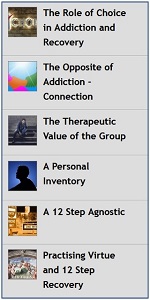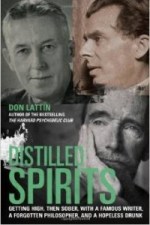Fifty Chosen Articles:
Number Twenty.
Originally posted in April 2016.
Meditation makes a difference in my day-to-day life in long term recovery.
By Thomas B.
I had my first meditation experience early in my second year of recovery, shortly after I received my one-year medallion at the original Manhattan Group in New York City in November of 1973. It was in the Unity Center auditorium, which in the 70s was a popular gathering place for many New York City area alcoholics.
What follows is an account I recently wrote about this “white-light” experience. Though vastly different, it rivals in intensity the one reported by co-founder Bill Wilson:
It’s a sunny, late Wednesday morning. I’m walking to Unity Center in the old Abbey Victoria Hotel in Midtown from my office on E. 38th Street just off Madison Avenue. I’m on my way to attend a first meditation experience. I’m most ambivalent as I walk on this crisp, bright, late fall day in mid-November of 1973. I’m in a most discordant state of mind, rather of a dither really. Several days ago, I discovered my second wife having an affair. I immediately moved out of our Gramercy Park apartment and am temporarily living in my office. A couple of weeks ago, I celebrated my first year anniversary of being sober by the grace of Alcoholics Anonymous.
The closer I get to Unity Center, the more ambivalent I become: “This is stupid. This is dumb. What good will meditation do? I want my wife back. I want to kill, or at least seriously injure, her lover, Tom.”
I’m forlorn, I’m heartbroken, I’m raging. As I approach the entrance to Unity on W. 51st Street, I’m seized by rebellion, “Screw this. I’m outta here.”
Just then, the wife of a friend of mine in recovery, Nancy, greets me enthusiastically. She’s most grateful to be sharing the Unity experience with someone else in recovery. Docilely, I follow her up the steps and into the large auditorium. Nancy joins some friends, and I sit by myself in the middle of an empty row of seats. The houselights dim, and a magenta spotlight illuminates the face and upper torso of Justin Morely, who will lead the guided meditation.
After several bars of soft, lilting music, Justin begins to speak in a rich baritone voice. Gently, he suggests that we quiet our minds and focus upon our breaths — to breathe deeply in, and then to deeply breathe out.
It’s difficult sitting still. It feels like bugs are crawling all over me. I have to stifle a tickle in my throat, so it doesn’t explode into a cough. My legs begin to ache; carefully I shift them, most self-conscious about disturbing others nearby.
My mind races with obsessive thoughts, multitudinous variations on the theme, “This is so stupid!” It takes every ounce of will-power to resist the frantic urge to run out of the auditorium screaming at the top of my lungs, “I gotta get outta this place!”
Despite my scattered consciousness, I slowly calm down. Imperceptibly at first, but surely gathering fullness deep within me, I become aware that in the darkness behind my closed eyelids a cascade of streaming galaxies flow in all directions.
I’m mesmerized by this infinity of light, a seemingly endless Niagara Falls of streaming light, within me.
Suddenly a huge, dark door superimposes itself over the streaming galaxies, which I can still see cascading in all directions behind the door. I don’t hear a voice, nor read any words, but solemnly, deep within me, this thought is imprinted:
‘To join this infinity of light, all you have to do is open the door.’
Slowly, with tears of gratitude flowing down my face, I watch my hand steadily reach up and open the door.
It’s forty-three years later. I’m still sober. I live a contented and successful life with a fourth wife, Jill. Though in the late autumn of my life, I am most grateful still to be able to recall with clarity this first meditation experience.
Now, wouldn’t it be reasonable, even likely, that after having experienced such a powerful first experience in meditation, one would become a devotee of a daily meditation practice? Well, perhaps it would be reasonable to presume this, but it’s not what happened.
Like most everything else in my process of long term recovery the only two practices I have consistently done 100% of the time: 1) not pick up the first drink, and 2) go to lots of meetings. I thereby experience HOPE — Hearing Other Peoples’ Experiences about how they stay sober a day at a time.
Getting sober in Manhattan during the 70s and continuing recovery throughout the 80s and 90s in the suburbs of New York City, I was exposed to a plethora of New Age, non-traditional spiritual practices, including a number of different approaches to meditation. In addition, I practiced yoga, Tai Chi and became an avid – perhaps obsessive even – long-distance runner.
In my professional work as a therapist, specializing in the treatment of addictions and PTSD, I sometimes led workshops on the benefits of meditation. As well, I recommended it strongly to most therapy clients with whom I worked.
 However, my personal practice of meditation, whether zazen, or counting breaths, or repeating a mantra or mindfulness, etc. for most of my long term recovery has been sporadic at best. I’ve mostly been a do-as-I-say kind of a guy, rather than a-leading-by-example sort of chap.
However, my personal practice of meditation, whether zazen, or counting breaths, or repeating a mantra or mindfulness, etc. for most of my long term recovery has been sporadic at best. I’ve mostly been a do-as-I-say kind of a guy, rather than a-leading-by-example sort of chap.
However, in July of 2014, my friend Roger C., suggested I try the meditation app, Insight Timer, which has scores of guided meditations from meditators – some famous, most not – from around the world.
I downloaded it onto my iPhone, and ever since I’ve been religiously using it.
As of today, January 29, 2016, I have had a total of 828 sessions on 499 days – today marks the 275th consecutive day – with at least one session, which constitutes 89% of the days since I started using Insight Timer in July of 2014, for a total of 203 total hours of meditation. I’ve more consistently meditated morning and evening than previously I ever have.
I’ve always been a classical Type A personality, an obsessively compulsive overachiever, both at work and at play. In an article on AA Beyond Belief, “Resentment, Rage and Recovery”, I described myself as sometimes being “constitutionally incapable of pausing when agitated.” Seething resentment, a short-temper and virulent impatience have sometimes caused me to experience debilitating difficulties sober, even with decades in recovery.
Has meditation made a difference in my day-to-day life in long term recovery? In a word, Y E S.
I can definitely discern that I am much more calm and less reactive than I’ve previously been in recovery. I am enabled not only to pause when agitated, but also to be able to do so readily applying Rule 62 to myself as well as to any situation about which I’ve become impatient or out of sorts. A noticeable benefit is that I’m enabled to do so within a relatively short while after becoming aware I am agitated.
Since regularly meditating, it’s been much easier than previously to live with the sometimes scattered, pressured and over-achieving noise in my head. I can step back and assert to myself a couple of dictums most conducive to serenity, or as Bill Wilson described it, emotional sobriety: 1) How important is it? and 2) Would I rather be right or happy?
Let me give you a concrete example of how I experienced a somewhat dire situation differently than normally I would have before regularly meditating. Not only was I enabled to appropriately deal with the situation, but I was able to do so with grace, dignity and good humor.
On a vacation with my wife to New York City several months ago, I was hospitalized for a week with severe congestive heart failure. I spent a number of hours while restless, unable to sleep during the long nights, listening and doing marathon sessions of guided meditations from Insight Timer. I was pleased to experience doing meditations were as restful as actually sleeping.
I attribute my increased ability to not only survive this life-threatening situation, but also to do so with a modicum of calmness, good humor and kindness towards the hospital staff, my devoted wife, and even myself during this stressful period to the regular and consistent daily meditation practice that I’ve finally engaged in for the past year-and-a-half.
I am immensely grateful that I finally allowed myself to experience regular and consistent meditation, which neuroscience has determined increasingly the past several decades to be extremely beneficial to one’s quality of life.
The quality of my recovery has immeasurably improved since I made the practice of meditation a regular part of my life.
Thomas B. has been sober since October 14, 1972. In these 49 years of sobriety, being active in AA service work has been an integral part of his recovery. He has written 21 articles on AA Agnostica and eleven on AA Beyond Belief. With his former wife Jill, he worked diligently to expand the secular movement within Oregon AA, establishing secular meetings in both Portland and Seaside.
Retired from a 30 year career in addiction treatment in New York, Thomas currently lives in Tucson, AZ, where his son, also clean & sober, lives. He still attends 3-5 AA meetings each week. Thank you for all that you have done for Secular AA, Thomas.
Thomas has written a total of 21 articles published on AA Agnostica:
- Twenty-Five Years of Listening (December 13, 2020)
- One Big Tent (September 23, 2018)
- 2018 ICSAA Toronto Conference (July 16, 2018)
- A Report of the Survey – The 2020 International AA Convention (May 17, 2018)
- Conference Question – Literature for We Agnostics? (March 29, 2018)
- Parallel Universes: The Story of Rebirth (March 1, 2018)
- A Secular Sobriety – Review (August 10, 2017)
- The Austin Convention – Survey Results (June 11, 2017)
- Bill Wilson, Always a Seeker (June 2, 2016)
- The Practical Tool of Meditation (April 21, 2016)
- Relevant Quotes for Secular AA (February 6, 2015)
- Identification (December 12, 2015)
- Why It Works (August 16, 2015)
- Bill Wilson’s Experience with LSD (May 10, 2015)
- PRAASA 2015 (April 12, 2015)
- Sponsorship in AA (February 22, 2015)
- Several Reports from the Santa Monica Conference
- Tradition Two: A Flaw in AA Service Structure? (September 28, 2014)
- Book Review: A Freethinker in AA (May 21, 2014)
- A Fellowship of the Religious? (April 20, 2014)
- One’s Religion is An Outside Issue (July 28, 2013)
- First AA Meetings (June 2, 2013)
He has also shared a total of nine articles on AA Beyond Belief:
- A Report on the Survey – The 2020 International Convention (May 17, 2018)
- Journaling (October 23, 2016)
- When I Decided to Stay Sober (August 14, 2016)
- A Tribute to AA Agnostica (June 15, 2016)
- Pacific Region Alcoholics Anonymous Service Assembly (April 24, 2016)
- My Experience as a GSR (March 13, 2016)
- WACYPAA, XIX (March 6, 2016)
- Compassion (March 6, 2016)
- Resentment, Rage and Recovery (October 25, 2015)
For a PDF of this article, click here: The Practical Tool of Meditation.
The post The Practical Tool of Meditation first appeared on AA Agnostica.



